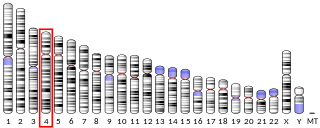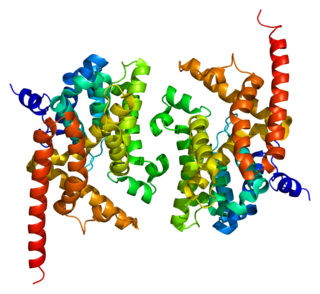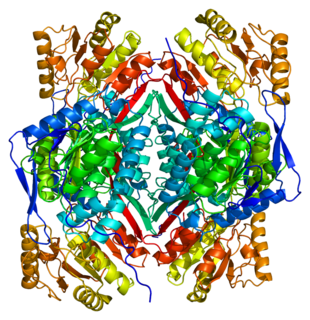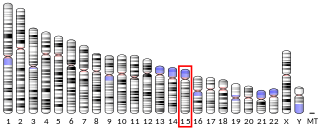
Succinate dehydrogenase [ubiquinone] iron-sulfur subunit, mitochondrial (SDHB) also known as iron-sulfur subunit of complex II (Ip) is a protein that in humans is encoded by the SDHB gene.

Paired-like homeobox 2b (PHOX2B), also known as neuroblastoma Phox (NBPhox), is a protein that in humans is encoded by the PHOX2B gene located on chromosome 4.

Sterol regulatory element-binding protein cleavage-activating protein, also known as SREBP cleavage-activating protein or SCAP is a protein that in humans is encoded by the SCAP gene.

Nuclear receptor TLX also known as NR2E1 is a protein that in humans is encoded by the NR2E1 gene. TLX is a member of the nuclear receptor family of intracellular transcription factors.

G-protein coupled receptor 143 is a protein encoded by the GPR143 gene in humans.

Neuronal cell adhesion molecule is a protein that in humans is encoded by the NRCAM gene.

Nuclear receptor coactivator 7 is a protein that in humans is encoded by the NCOA7 gene.

High affinity cGMP-specific 3',5'-cyclic phosphodiesterase 9A is an enzyme that in humans is encoded by the PDE9A gene.

Calpain-5 is a protein that in humans is encoded by the CAPN5 gene.

Aldehyde dehydrogenase 1 family, member A2, also known as ALDH1A2 or retinaldehyde dehydrogenase 2 (RALDH2), is an enzyme that in humans is encoded by the ALDH1A2 gene.

Keratin, type I cytoskeletal 23 is a protein that in humans is encoded by the KRT23 gene.

Putative survival-related protein is a protein that in humans is encoded by the CASZ1 gene.

Gamma-aminobutyric acid receptor subunit theta is a protein that in humans is encoded by the GABRQ gene. The protein encoded by this gene is a subunit of the GABAA receptor.

Potassium voltage-gated channel subfamily H member 8 is a protein that in humans is encoded by the KCNH8 gene. The protein encoded by this gene is a voltage-gated potassium channel subunit.

CDKN2B-AS, also known as ANRIL is a long non-coding RNA consisting of 19 exons, spanning 126.3kb in the genome, and its spliced product is a 3834bp RNA. It is located within the p15/CDKN2B-p16/CDKN2A-p14/ARF gene cluster, in the antisense direction. Single nucleotide polymorphisms (SNPs) which alter the expression of CDKN2B-AS are associated with human healthy life expectancy, as well as with multiple diseases, including coronary artery disease, diabetes and many cancers. It binds to chromobox 7 (CBX7) within the polycomb repressive complex 1 and to SUZ12, a component of polycomb repression complex 2 and through these interactions is involved in transcriptional repression.

FAM20A is a protein that in humans is encoded by the FAM20A gene.

Phosphatase and actin regulator 1 (PHACTR1) is a protein that in humans is encoded by the PHACTR1 gene on chromosome 6. It is most significantly expressed in the globus pallidus of the brain. PHACTR1 is an actin and protein phosphatase 1 (PP1) binding protein that binds actin and regulates the reorganization of the actin cytoskeleton. This protein has been associated with coronary artery disease and migraines through genome-wide association studies. The PHACTR1 gene also contains one of 27 SNPs associated with increased risk of coronary artery disease.

ADAM metallopeptidase with thrombospondin type 1 motif, 17 is a protein that in humans is encoded by the ADAMTS17 gene.

Zinc finger protein 536 is a protein that in humans is encoded by the ZNF536 gene.

Heat shock protein family A (Hsp70) member 12B is a protein that in humans is encoded by the HSPA12B gene.


















